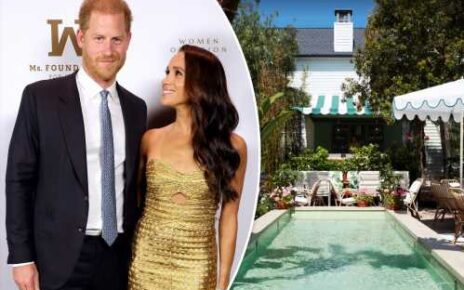“Native humor can be dark and raunchy — and it’s weird,” says Tazbah Chavez, a writer, producer and director on “Reservation Dogs,” the off-kilter show that follows Native teenagers navigating their community in rural Oklahoma.
The quirky, often bittersweet series is both goofy and sublime, and the comedy-drama’s first season has already garnered two Independent Spirit Awards, a Peabody Award, a Gotham Award, an American Film Institute Award and Television Academy Honors. Created by writer-director Sterlin Harjo, a Seminole and Muscogee Creek filmmaker from Oklahoma, and New Zealand-born filmmaker Taika Waititi, the pair of friends share an interest in mining their respective Indigenous cultures for funny, moving stories.
Executive producer Garrett Basch understood their friendship dynamic and nuanced cultural backgrounds well, playing an instrumental role in the development of the series and encouraging the co-creators to take “Reservation Dogs” where they believed it needed to go.
“The reason the show is successful is that we were trusted and allowed to go as far and hard as we needed to,” says Harjo. “The industry’s depiction of our people has been a big lie from the beginning. To offset that, we had to be unabashedly honest. FX let us do that. A big part of that honesty is our humor.”
Waititi agrees, explaining how crucial it was to honor their disparate, yet often kindred experiences in their approach to storytelling.
“Even though we were born and raised in completely different parts of the world, the cultures and the small towns that we grew up in mean we have a very similar outlook and sensibility,” says Waititi. “We’re aligned in the sense that we want to tell stories about marginalized people who live on the sides of society.”

The series draws from Harjo’s personal experiences growing up in Holdenville, Oklahoma. “He knows that world a lot better than I do,” says Waititi. “I couldn’t hope to come in and tell the Native American story by myself, and nor would I want to — it’s just not appropriate. I knew that I’d be able to help, in that I’m a good storyteller and I could help shape this thing into something that I felt was very Taika and very Sterlin.”
Infused with Waititi’s brand of humor, the show is balanced with deep emotionalism.
“Taika does this thing where he’s able to make you feel joy at the same time that you’re feeling pain, and then brings you right back out of it,” says Chavez. “Sterlin’s style on his own is very much like that, so I think it was a very good coming together of minds.”
“There wasn’t anybody else to tell this story but Sterlin,” says Devery Jacobs, who plays teenager Elora Danan, a character who dreams of escaping her world and heading to California in the wake of her friend’s passing. Jacobs also serves on the show’s writing staff; every fellow writer, director and member of the principal cast, as well as much of the crew, is Indigenous.
“I’ve never seen somebody honor their community’s ways while also operating in the industry,” Jacobs says. “Ultimately, that’s what this show is about: community. It’s a story that follows many people and also a world that we live in. I think it’s his experience and love for community that has really been the anchor for this show.”
Chavez says Harjo’s experience resonated with the cast and crew. “Because all of us were from Native communities and we’re culturally connected, it wasn’t hard for us to understand the upbringing that Sterlin had, because it’s the same upbringing that we had,” she says. “Each of us has family members and community members who are the same as the people he experienced — each of us had our own version of an Uncle Brownie back home, or we all know a Willie Jack.”
Every aspect of the Native experience was ripe for driving laughter and pathos. “There was no idea that was too big or too wild for the room,” says Chavez. “Some of our best ideas came from where somebody was like, ‘OK, this might be crazy, but one time my Auntie said this to me … ’ Sterlin really breeds a culture in which no idea is too simple, is too crazy or is too cheesy. That’s the beautiful part of this show: All of those things are threaded together.”
Jacobs suggests it’s the specificity of these stories that infuses them with universal appeal. “Some of my favorite stories out there are the ones that are from cultures that are completely different from my own,” she explains. “I think of ‘Minari’ or ‘Moonlight’ — so many projects that center around really specific stories of these experiences from people from different cultures. I find that’s almost a greater entry point. Just being so specific in your cultural and human experience ends up becoming more universal.”
Then, there’s Waititi’s distinctive comedic flavor. “The treatment of Indigenous peoples in media has always been very serious, and it’s been a severe lack of comedy, which is ironic and sad because our peoples are very funny,” he notes.
“‘Reservation Dogs’ has a very Native humor — it’s very dry, very quick-witted,” agrees Lane Factor, who plays Cheese, the mischievous youngest member of the group. “He’s a deadpan character. It’s not like he’s just trying to actively tell jokes and make light of every situation, but along with a lot of our Native characters, their humor is just who they are. It’s a good way that many Indigenous people cope with problems.”
That quirkiness also helps offset the darker aspects the show explores.
“[We’re] keeping the stories lighthearted, until you’ve got a heavier message to deliver,” Waititi says. “I always find that comedy is a great way of getting the audience to let their guards down, and that for me is a better way of pulling them in and involving them in the story.”
The widespread appeal of the show “means everything,” says Jacobs. “It means that we can be seen in the way that we’re determining, as opposed to what Hollywood and Western society has deemed us as.”
Source: Read Full Article


